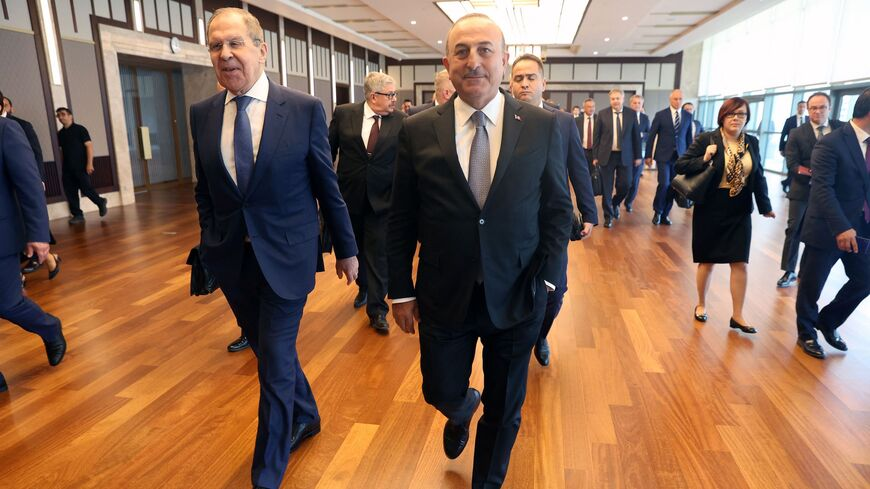
The top Turkish diplomat aired a rare complaint over the Russian stalling of constitutional talks between the warring Syrian actors, calling on Moscow to allow the process to resume.
A high-level Russian diplomatic delegation is heading to Turkey on Thursday for talks amid repeated Turkish threats of a new ground offensive against the Kurdish groups in northern Syria.
The delegation led by Deputy Russian Foreign Minister Sergey Vershinin will hold talks with their Turkish counterparts headed by Turkey’s Deputy Foreign Minister Sedat Onal, the Turkish Foreign Ministry said.
The visit comes as Ankara threatens to launch a new ground operation against the Syrian Kurdish groups in northern Syria. “Someone comes out and says: ‘You can’t do this in Kobani, you can’t do that in Kobani.’ Kobani is finished,” Turkey’s President Recep Tayyip Erdogan said Tuesday in reference to the Syrian Kurdish town that remains under Russian military influence. “We’ve been taking the necessary measures both in Idlib and Kobani and we will continue to do so,” he added.
Turkey, which backtracked from its ground operation plans in July amid strong Russian and Iranian objections, brought the matter back onto its agenda after the bomb attack in Istanbul last month. Ankara has accused the Syrian Kurdish groups of being behind the attack and launched a massive air campaign against the Kurdish-led Syrian Democratic Forces (SDF) positions. The US-allied SDF flatly denied any involvement in the attack.
The visit also comes as Erdogan has been expressing fresh interest in a meeting with the Syrian President Bashar al-Assad. However, citing two Turkish sources, Reuters reported on Dec. 2 that Damascus was resisting the Russian efforts to broker a summit between the two leaders.
Asked about the Russian delegation’s visit on Wednesday, Turkish Foreign Minister Mevlut Cavusoglu stopped short of repeating Ankara’s threats, but aired a rare complaint over the Russian stalling of the constitutional talks between the warring Syrian actors.
“We know that Russia does not want to go to Geneva, Switzerland, by citing visa problems. We are also working on alternatives,” Cavusoglu said during a joint presser with his Moldovan counterpart. “But the political process must be accelerated. We’ve been stressing how important this is for the sake of permanent stability.”
He added that the war in Ukraine, Libya and bilateral issues would also be discussed during the talks. “We have clearly not been on the same side with Russia on these issues, but our engagements are proceeding and we have seen its benefits.”
The eighth round of the Syrian talks, held in May, aimed to draft a new constitution in a bid to find a political settlement to the civil war. Since then, Russia has refused to send a delegation to the talks between the rebel groups and the Syrian government held under the auspices of the UN in Geneva, Switzerland. Syrian Kurdish groups controlling a large chunk of territory in northern Syria have been excluded from the talks by Ankara’s veto.
Russia’s special envoy for Syria Alexander Lavrentyev said in June that Switzerland lost its neutral status after the country joined the Russian sanctions slapped on Moscow over its invasion of Ukraine.
UN special envoy for Syria Geir Pedersen, in turn, said Nov. 29 that the Russian concerns over the venue “were comprehensively addressed” by the Swiss authorities, but that “a further issue has now been raised which is not in Swiss hands,” without elaborating.
 Eurasia Press & News
Eurasia Press & News



